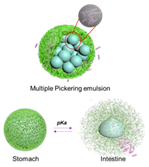Background
Probiotics effectively inhibit harmful bacteria by secreting antibacterial bacteriocin, lactic acid, intestinal settlement of harmful bacteria, which enhances our immune system. Probiotics must survive by withstanding the gastric acid secreted in the stomach, bile from the gallbladder, and various digestive enzymes from the small intestines. However, adding probiotic cells directly to foods results in a significant reduction in cell viability from production through to the time of consumption. Therefore, probiotics must be encapsulated with another protective material, where the encapsulation protects probiotic the cells from external environmental factors and promotes bacterial viability during processing, storage and digestion.
Description of the invention
This technology describes two different methods to produce: i) ferulic acid (FA) coated cellulose nanocrystals (CNC) and ii) shellac (SH) complex with CNC utilizing CaCl2 for encapsulating and preserving probiotics in acidic conditions. The FA functionalized CNC acts as an antioxidant and pH-responsive plant-based emulsifier for the preparation of “smart,” multiple Pickering emulsion containing probiotics (yeast). The encapsulated CNC-shellac microcapsules in the presence of CaCl2 provides a sustainable, biocompatible, and long-lasting enteric coating system that maintains the survivability of probiotics during exposure to simulated gastric and intestinal environments. During processing, storage and transport through the gastric environment, under both methods the yeasts were protected and then triggered release in the intestinal environment at a pH of 7-8. This delivery system could be applied to functional foods, cosmetics, and pharmaceuticals.
Advantages
There are several advantages in the proposed technology: (1) simple process; (2) non-toxic; (3) pH-responsive; (4) food-grade materials; (5) powerful antioxidant property; (6) high survivability of probiotics; (7) low concentration of ethanol; (8) high enhancement within the simulated intestinal fluid (SIF) environment; (9) rigid complex coating.
Potential applications
- Encapsulation of active ingredients in functional foods, pharmaceuticals or cosmetics.
- Enhanced delivery of probiotics in yogurt, breakfast spreads etc.
- Delivery of probiotics to aquatic animals, and cosmetics
Image

Reference
10207
Inventor(s)
Dr. Michael Tam
Dr. Baek, Jiyoo
Dr. Ramasamy, Mohankandhasamy
Cho, David Gunhee
Patent status
US patent application #63/372,209, filed on February 24th 2022
Stage of development
Prototype
Contact
Scott Inwood
Director of Commercialization
Waterloo Commercialization Office
519-888-4567, ext. 43728
uwaterloo.ca/research